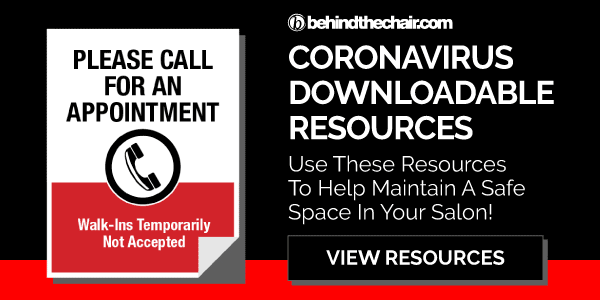COVID-19: Can A Client Sue You?
What You Need To Know About COVID-19 Liability For Salons
Coronavirus Liability In Salons
With the unprecedented fallout from the coronavirus pandemic comes a scary thought: Legal experts are worried there will be a slew of lawsuits from clients who allege they contracted the coronavirus while visiting a business. Nearly 3,000 have already been filed including numerous class action suits against large companies. That’s why it’s important for all stylists, and especially salon and suite owners, to know their risks and how to protect their businesses.
Disclaimer: The information in this article is provided for informational purposes only, and should not be construed as legal advice on any subject matter. You should not act or refrain from acting on the basis of any content included in this article without seeking legal or other professional advice.
How Can My Salon Be Held Liable For COVID-19?
A business can potentially be held liable if management is aware that an employee or client has been diagnosed and does not take “reasonable action” to prevent the spread of the virus through cleaning and disinfecting, and does not immediately instruct the employee to go home and stay home until they are no longer contagious.
While it will be challenging for a guest to prove they contracted the coronavirus in a salon versus other places, it’s smart as a business owner to do everything you can to protect yourself.
How To Minimize The Risk of a COVID-19 Lawsuit From A Client
Here’s what the National Law Review recommends to protect yourself from coronavirus-related suits from customers:
1. Follow all recommended guidance.
Follow applicable guidelines from the Centers for Disease Control & Prevention (CDC), Occupational Safety and Health Administration (OSHA), and your state and local public health departments and governments for minimizing the risk of exposure. Doing so is not only the best way to keep your customers and staff safe, but also your best defense against COVID-19 suits.
This means adhering to any recommendations on cleaning, disinfecting, operating your business, communicating with people who interact with your business and procedures on how to identify and track possible cases at your workplace. For example, if local guidance suggests wearing face coverings during close-contact services, it is in the best interest of your business to adhere to this suggestion. Any government guidance and rules will likely be evidence of “standard of care required” and will be the baseline that businesses should follow to avoid liability.
Further, violations of local, state or federal guidance could result in citations, which could be used as evidence in lawsuits later.
Need a checklist of cleaning and disinfecting procedures? Download checklists and more coronavirus resources here!
2. Train employees on policies and procedures.
Another way to protect your business from COVID-19 suits is to ensure employees who interact with guests are trained on all business policies and procedures for minimizing the risk of exposure. The National Law Review recommends that employees know:
- How to respond to guests’ questions about your salon’s new policies and procedures
- When to escalate specific questions to management
3. Don’t oversell what you are doing to minimize risk.
“Actually do what you say you are going to do, do it consistently, and do it accurately,” the National Law Review says. If you post signs that you will be requiring guests to wash their hands upon arrival, you must make sure this is consistently happening for every guest. If you advertise that you are limiting capacity in your salon, make sure you have a method to assure compliance.
Pro Tip: Designate a person or team to be in charge of monitoring and ensuring compliance with federal, state and local guidance and implement regular check-ins to make sure procedures are consistently being followed.
4. Review third-party contracts and your insurance policy.
You may be taking every possible step to protect your business, employees and customers, but you should also review indemnification obligations and understand if those obligations are ensured. The National Law Review recommends reviewing contracts and liability obligations with suppliers, cleaning services, marketing agencies, etc. and make sure they have appropriate coverage for any risk.
You should also know the scope of your own insurance coverage. Check with your liability policy insurer to see if you have any protections in place—or if you have none. Your policy may have a virus exclusion or other exclusions, but discuss with your insurer and see what IS covered.
Should You Use A COVID-19 Waiver With Clients?
Many salons are having clients sign COVID-19 liability no-fault waivers as possible protection against lawsuits for exposure to coronavirus. This is a very good idea, but remember, if you know one of your team has contracted the virus and is still working on clients or if you know you were exposed to a client who tested positive and you still continue to work, this could (and likely would) be considered negligence by you and your salon and the court may find your client waiver will not hold up in a lawsuit. Click here to see examples and learn all about client waivers!
Team Members
It may be a good idea to ask employees to sign acknowledgements or promises saying they will always adhere to the coronavirus policies and procedures in your salon. These signed forms might include making sure the hairdresser and the client are wearing masks at all times and that she and her client are both washing their hands before the services, for example. Remember, the salon owner is not always in the salon, so it’s important the team can trust each other and a waiver is a good way to enforce this expectation. For more info on COVID-19 liability with employees, click here. If you own a booth rental salon, click here for what you need to know.
Should I Be Contact Tracing?
Public health departments attempt to identify and notify people who have been in contact with someone who is positive for COVID-19. If a client tests positive and informs the public health department that they visited your salon, it is possible that you will need to share your log of appointments on the day that client came in to assist the local health department.
Keeping an accurate record of clients coming in and out every day not only helps with contact tracing efforts, but could help in a liability case. Whether you achieve this with client waivers or questionnaires or another method is up to you. We are fairly confident there are still privacy issues in regard to providing this information, so keep up with the news and your attorney to understand your responsibilities.








